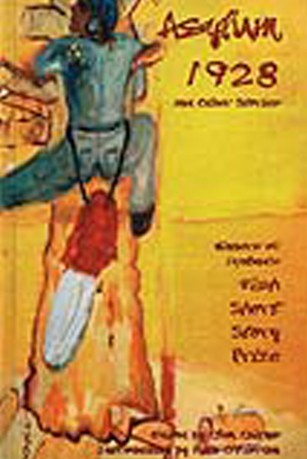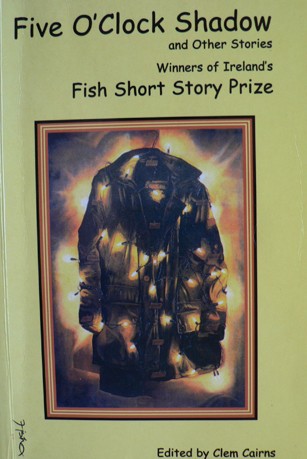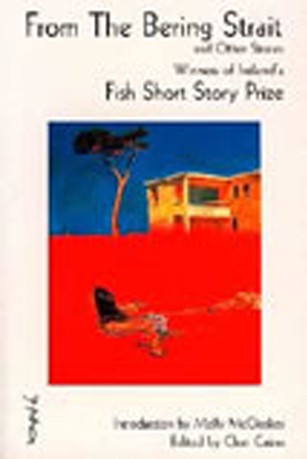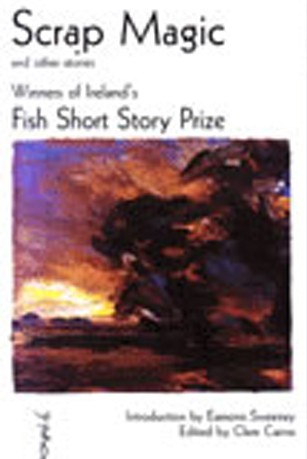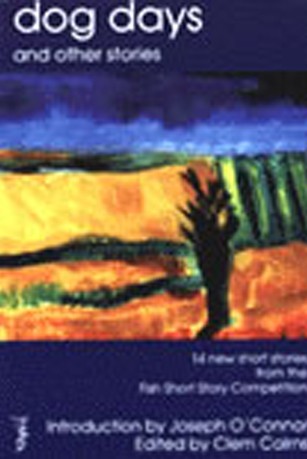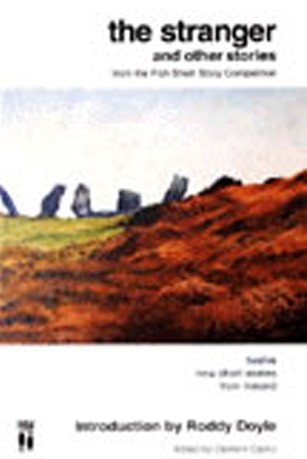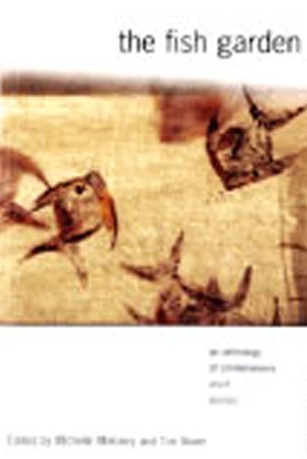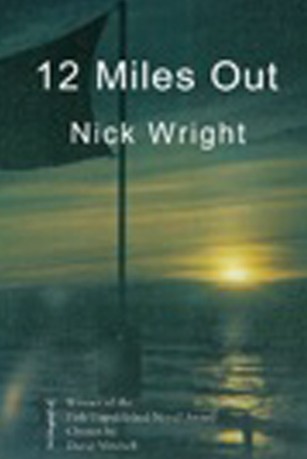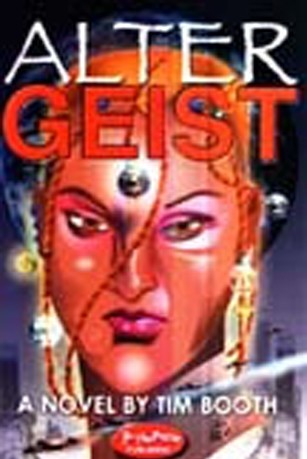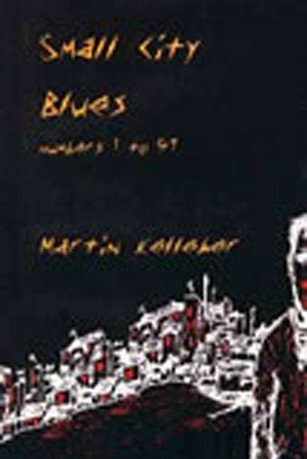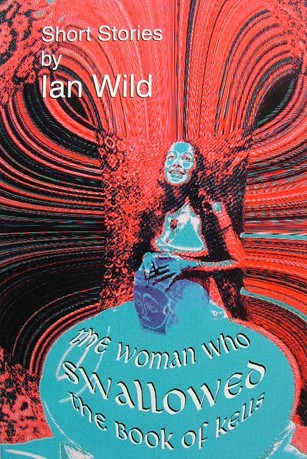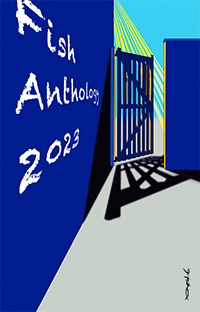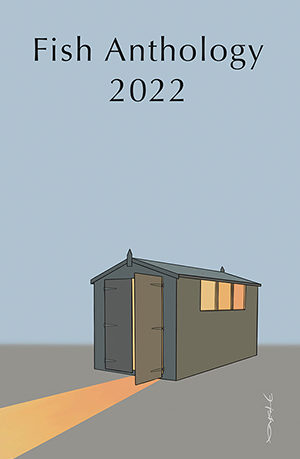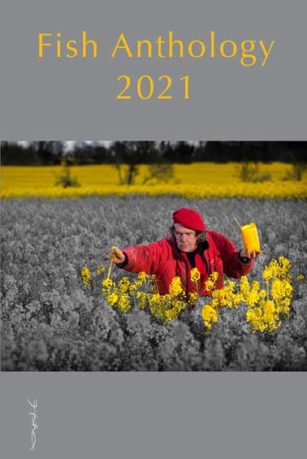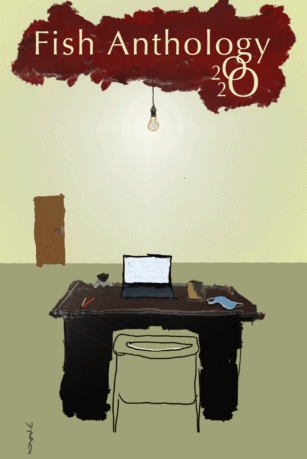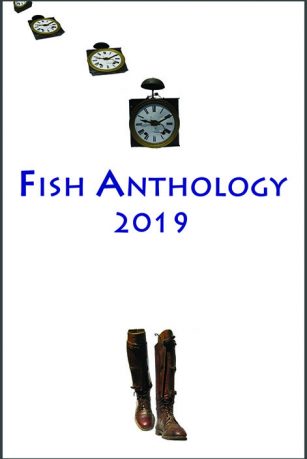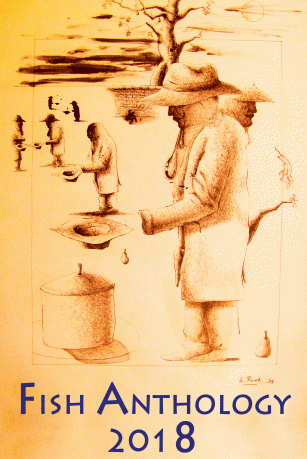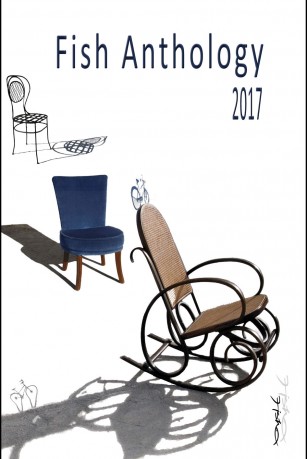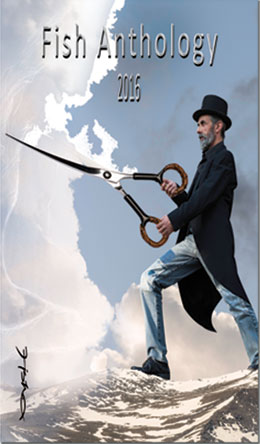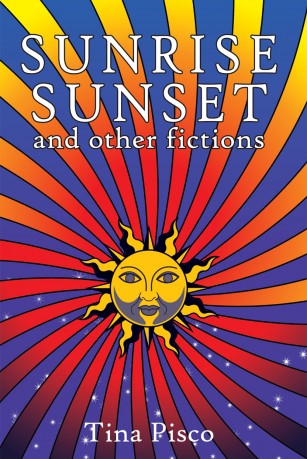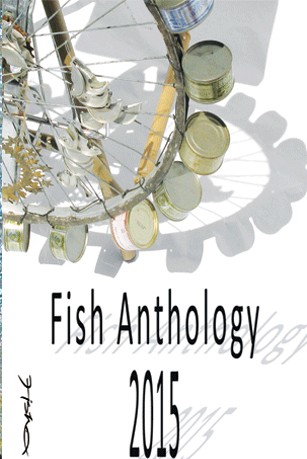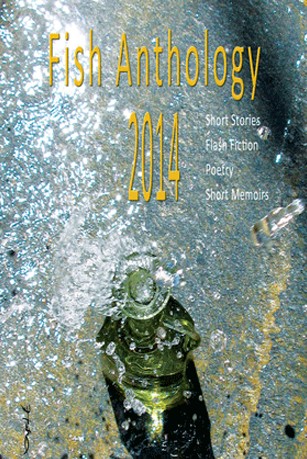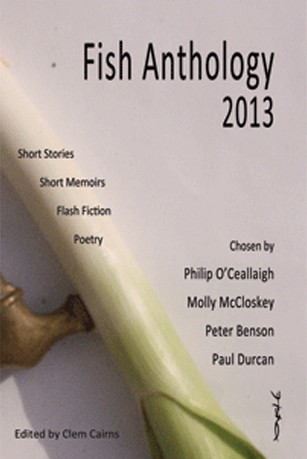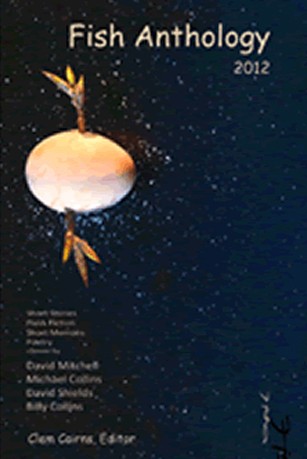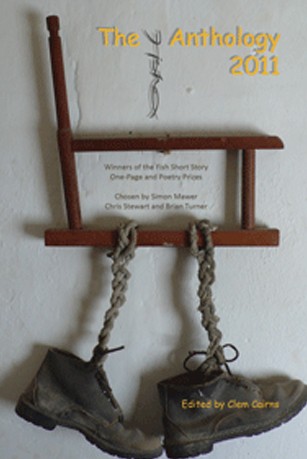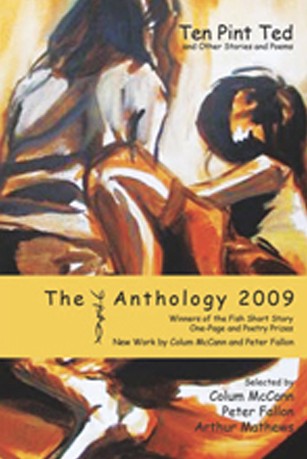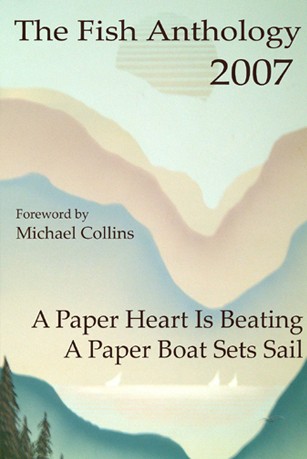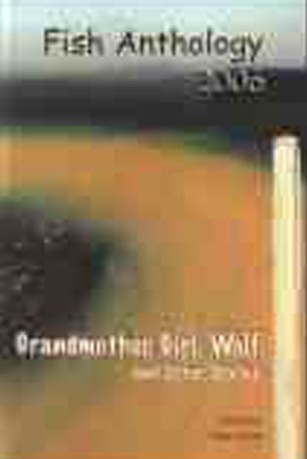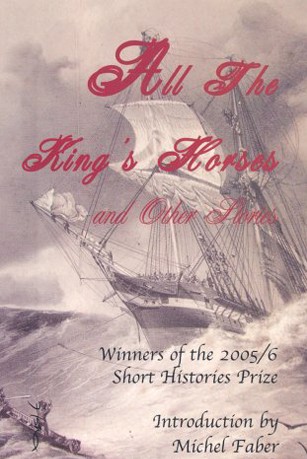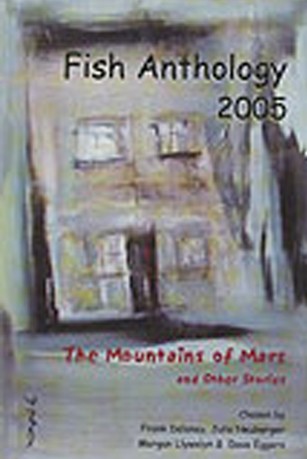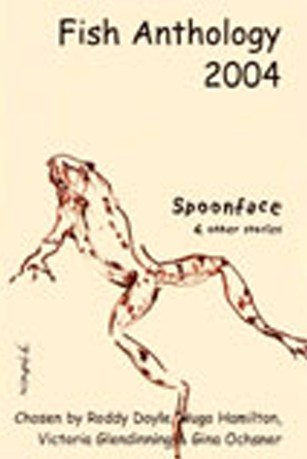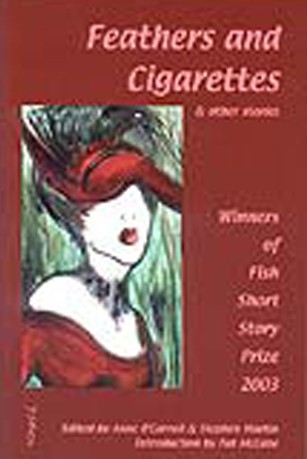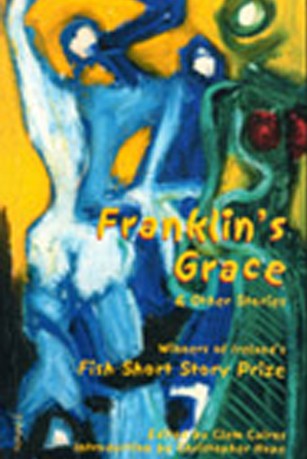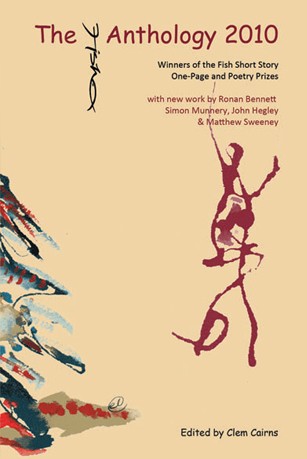
Fish Anthology 2010
ISBN: 978-0-9562721-1-9
This anthology contains the winning stories and poems from Fish Publishing’s three annual competitions – The Fish Short Story Prize, The Fish One-Page Prize and The Fish Poetry Prize, plus new work from judges Ronan Bennett, Simon Munnery, John Hegley and Matthew Sweeney. Below you can read the two introductions from this anthology by Ronan Bennett and Matthew Sweeney, and the acknowledgements by editor Clem Cairns. Listed below you will find all authors and poets published in this anthology along with the titles of their work. Read one of the stories – Sightseeing in Louth by Bernadette M. Smyth and a poem – Upstairs by Ron Carey Introductory Notes Ronan Bennett There is a particular romance about the short story: the perfectly achieved story transcends the limitations of space with profundity and insight. We all have our perfect examples: mine is The Fly by Katherine Mansfield. I was in thrall to Katherine Mansfield when I wrote my first short story, at the age of fourteen. My story was called The Miner: Greys. The elaborate title was not its only problem (what was that colon doing there?). Recklessly ignoring the injunction to write about what you know, I attempted to tell the story of an anxious young worker – sensitive, of course, and misunderstood, of course, with a keen but precarious sense of his own individuality – about to leave home in the company of his father to begin his first day down the mines. I described a long, observational breakfast scene in which the young man’s mother brews tea and makes bread and dripping. I wasn’t sure what dripping actually was – that detail came from Orwell’s Down and Out in London and Paris. Not much is said at the breakfast table. The narrator reflects on his life and future while the tea is drunk and the bread and dripping consumed and Mother gives the men their packed lunches and eventually Father picks up his lamp (the story seems to be period, though what period is not specified) and leads his son out to the street, where all the other miners join in a slowly rolling human river of toilers. It is then that the narrator has an epiphany: he sees that all the faces around him – his father’s included – are grey and worn down, and in this instant he understands that his own face will be like theirs, his fate will be theirs. His individuality – that teenage holy grail – his specialness is but an illusion. I was brought up in Belfast, where there were mills and shipyards but no mines. My conception of mines, miners and mining was entirely and, for the story, fatally second-hand, largely gleaned from Richard Llewellyn’s How Green Was My Valley and the film adaptation of Somerset Maugham’s The Razor’s Edge starring Tyrone Power (an unlikely miner, of course, but a compellingly romantic one). I re-read my story, which I found among some papers my mother was throwing out when leaving her house about three years ago, and while there was inevitably some embarrassment there was also surprise, for it was not entirely a failure. The setting I had attempted could never hope to convince (I did not so much as meet a miner until the NUM strike of 1984-85) but I realized I had been writing something about which I did have some first-hand experience. My early teenage years were dominated by the sense that my family was broken. My father had left when I was two and my brother one, and my mother never really recovered from the break-up. She became one of what I suppose must be called the long-term broken-hearted. She did her best to create a normal home for her two sons, and there were times of happiness and laughter. But – as the years have passed – the sound of the laughter has grown dimmer. What I seem to remember now is mostly an air of melancholy. We did not live in a mining town or a part of town that could ever have been mistaken for a mining town. We lived, in fact, in a modest but pleasant estate on the edge of town. In May the cherry trees blossomed briefly and there were green lawns and hedgerows, and nearby a glen – or at least an urban version of a glen, complete with water-logged plastic bags snagged on the rocks. We were a mile from the bus-stop and in the evenings I would run down to meet my mother coming home from work. Her bag was always heavy, always full of potatoes. I would carry it and we would walk together up the hill to our block of flats. I was an earnest boy. I always wanted to know what my mother truly felt, what she was truly thinking, and sometimes when she was tired my persistence and melodrama exasperated or irritated her. But more often we talked companionably. There comes the moment when children see the face of their mother or their father objectively for the first time. Before that moment the face belongs not to an individual but to Mother or to Father. One day I saw my mother’s face, and I saw in it worry, sadness and disappointment, and some part of me knew even then that this, really, was in store for all of us. When, at fourteen, I wrote The Miner: Greys I was writing not about a miner about to become his father, a man ground down by toil and by life’s disappointments, but about my own mother and what I could already see was a life that could have been much more than it turned out to be. The Miner: Greys was never published, and never should be. Its theme of options narrowing, of life being squeezed by life itself, was beyond the powers of its teenage author. My second attempt at this theme, my offering for this collection, was The Crime and Suicide of Harry da Souza, my first published short story. It has its own problems – the writing is quite artless and the story overly schematic – but it is at least, for what it’s worth, a small advance on its predecessor. And – it’s sole justification for inclusion here – it is felt. What I look for in fiction, of whatever length, is authenticity and intensity of feeling. I will admire beautifully crafted sentences, and sometimes envy a telling phrase or description, but these alone will not move me, and I demand to be moved, to be transported, so be introduced into other lives. As a judge I looked first and foremost for authenticity in the stories I was sent to read. I looked for what seemed to me to be genuine experience (which is not the same as autobiographical experience) expressed convincingly and well. Some of the stories were, frankly, poor. Others were as second-hand as The Miner: Greys. Some tried to be clever and some relied heavily on a familiar kind of folksy humour. Several featured copious amounts of drinking. With some I got the sense that the writer had got up that morning and said to himself: I think I’ll write a short story today, now what can I write about? None of these carried much appeal. However, a number stuck out because they convinced me that the writers were writing because they simply had to; they had to write down what was in their heads because if they didn’t they would be dissatisfied with themselves for a long time to come. In this category I include The Sort of Luck that Happens to Curtis, Blue, Ghost Wedding and Back in the Day. If I’ve been duped, which is entirely possible, then at least it’s a tribute to their craft. Two stories stood out for me above the rest: A Matter of Luck by Jane Camens had authority and feeling, and The Birthday Book by Eve Vamvas was also very impressive (it could easily have been the winner and on a different day might well have been – anyone who has judged such things will, if they are honest, make the same confession). Both writers are to be commended, and I wish them every success in the future – a wish I extend, along with thanks and grovelling apologies for testing their patience with my repeated failures to meet entirely reasonable deadlines, to everyone at Fish. Ronan Bennett London May 2010 Introductory Notes Matthew Sweeney Over the years I’ve been asked to judge or co-judge a number of poetry competitions. I must admit I like co-judging better, as then I can bounce my opinions and preferences against those of my fellow judge. Even when I judge them alone I tend to show certain poems to other poets, whose opinions I value. Either way, I favour reading every poem that’s been entered, rather than trusting to an in-house sifter – I always feel that some of the more maverick entries will go missing that way, and sometimes maverick is refreshing and good. Certainly, I’m always looking for poems that surprise me in some manner, that manage what Frost thought a poem should be: ‘A fresh look and a fresh listen.’ Clichés are the opposite of this, as are poems written in a manner that suggests the world is still believed to be flat, and several of the recent centuries have not happened. One cannot decide to rule out poetic developments of the 19th and 20th centuries because one doesn’t approve of them – and anyway if people who do that think they alone now are writing the pure poetry of John Keats, they are very far from doing so. If John Keats came back from the dead he would be dismayed, but at the same time he would immediately see what the top poets of today are doing. I’ve read poems in judging this competition – as with every previous time – that were very un-fresh indeed. One entry had well-deserved criticisms scribbled on the text, yet was still entered! Many, despite the rules stating that this was forbidden, had the writers’ names at the top or bottom of the poem. I noticed a small number of entries that seemed to be clearly targeting the judge’s known enthusiasms, which is never a good idea. Having said that, when I got to my longlist of 200 or so, I began to think that the quality of poems entered in this competition might be pretty high, really. Certainly when I got it down to my shortlist of 25, I was sure of this – there was little to separate the ten prizewinners from the rest, but that little was what I was looking for in my repeated re-readings. I feel there is a range to the ten chosen poems, and that each is strong in a different way. The top three surprised me most, and the winner deals with an old subject in a very sure-footed, contemporary manner – understated, and because of that, packing a powerful emotional charge. It was good to encounter this, and others of the poems I read in judging the competition. Matthew Sweeney Cork May 2010 Editor’s Note and Acknowledgements I hope that this book is a stepping-stone to greater things for the 29 authors who made it through the competitions. Congratulations to them – there were 1,800 short stories, 1,500 one-page, and 1,000 poems, and there are 30 pieces here, written by 29 authors. Sixteen of them are female and 13 male. Nine are in the UK, eight in Ireland, four each in Australia and the USA, two in Canada, one each in Argentina and France. Five of the poems and one of the short stories are Irish. There are no One Pagers from the USA, and only two short stories, a change from recent years when the USA dominated. Where are you all? We need your stories. Australia is represented in each category, as is Ireland and the UK. The overall winners are from Australia – Jane Camens, the UK – Zoe Sinclair, and Ireland – Catherine Phil MacCarthy . That’s the mix. The staff who shortlisted, edited and critiqued all year are vital to the creation of this book, and my thanks to them. They are Tina Pisco, Tessa Gibson, Mary Jane Holmes, Mary Hawkes, Conrad Hart, Max Brooker, Brenda Berck, Jayaviti Baines, Afric Hamilton, Pauline Lloyd, Sasha Pisco, Jen Hawkes, and Kate Monson. Jula Walton does book design, website, administration, planning, decision-making, and editing. Without her it wouldn’t happen. Sally Ellsbury helped throughout the year. Emma Capper painted Leaving, which features on the cover. Max Brooker did the proofing. Sue Booth Forbes donated the second prize in the Short Story competition of a week at Anam Cara Writers’ and Artists’ Retreat on the inspiring Beara Peninsula. The caliber of judges is important to any literary competition, and we got the best. Ronan Bennett judged the Short Story Prize, John Hegley and Simon Munnery the One-Page, and Matthew Sweeney read all of the entries to the Poetry Prize. Thanks to them, and also for each contributing a piece for the anthology. Clem Cairns Durrus 2010
Contents
|
SHORT STORIES |
||||
|
A Matter of Luck |
Jane Camens |
|||
|
The Birthday Book |
Eve Vamvas |
|||
|
The Sort of Luck that Happens to Curtis |
Stef Pixner |
|||
|
Sightseeing in Louth |
Bernadette M. Smyth |
|||
|
Ghost Wedding |
Jacob M. Appel |
|||
|
Back in the Day |
Gabriel Valjan |
|||
|
Playing with Guns |
Gabriela Blandy |
|||
|
The Window Kisser |
Stef Pixner |
|||
|
The Best Laid Plans |
Ingrid Baier |
|||
|
Blue |
Wendy Dranfield |
|||
|
The Crime and Suicide of Harry d’Souza |
Ronan Bennett |
|||
|
ONE-PAGE STORIES |
||||
|
Darling Mummy |
Zoe Sinclair |
|||
|
Counting Na’an |
Henrietta Richer |
|||
|
The Gold in Her Ring |
Susan O’Connor |
|||
|
And God Said |
Simon Cornish |
|||
|
Buddhists and Elephants |
Kyle Martin Jones |
|||
|
The Will and Testament Before Last |
Richard Bardwell |
|||
|
Wise Guys |
Ted Sheehy |
|||
|
Unfaithful Wings |
Roanne O’Neil |
|||
|
I Thought You Should Know |
Julie Balloo |
|||
|
I Don’t Forget |
Seamus Scanlon |
|||
|
Floating |
John Hegley |
|||
|
The True Confessions of Sherlock Holmes |
Simon Munnery |
|||
|
POETRY |
||||
|
Limbo |
Catherine Phil MacCarthy |
|||
|
The Mirror Ball |
Alexander Velky |
|||
|
Last Night I Lay Awake |
Toby Fitch |
|||
|
Ward Allen Woods |
Ken Taylor |
|||
|
Debris Field |
Frederick Pollack |
|||
|
The Fisherman’s Song to the Mermaid |
Breda Wall Ryan |
|||
|
Upstairs |
Ron Carey |
|||
|
The Public Poet |
Frank Prem |
|||
|
The Slim Volume |
Terry McDonagh |
|||
|
Getting Dressed |
Helena Nolan |
|||
|
The Last Day of Summer |
Matthew Sweeney |
|||
Sightseeing in Louth by Bernadette M. Smyth The whole thing is to help John. This is the reason why I have to light the sitting room fire every evening, and squash in beside Julie every night, it’s the reason why Mammy and Granny and Patricia have made the house into a circuit of tea and sandwiches – it’s all in the name of Helping John. John is a third cousin once removed, or a first cousin three times removed, well he’s some kind of relation anyway, some shoot of some twig of some branch of the family tree which has found itself growing, by accident, in America. He’s coming to Louth to explore his roots, i.e. us, and the plan is to feed him and warm him and give up your bed for him, it’s to generally help him, so that he can go back to America and tell them all how wonderful the Irish are, and we can breathe a collective sigh of relief that he’s gone – thanks be to Jesus, the Yank who imposed on us for two full weeks in April. He’s wearing an orange raincoat when he arrives, like the ones you see on all the tourists in Dublin, and this is my first picture of John, emerging from Mammy’s car like a flame, then blazing after her towards the front door. “You’re very welcome John,” Granny says, marshalling him into the kitchen, “You must be starved after your journey, are you?” “Well actually I got dinner on the plane …” But it’s too late, she’s already sliding a plate in front of him, made tall with rashers and eggs. John is from Boston. He’s a teacher there, and has a beard to show that he’s serious about it. He’s quiet and polite, and we’re all relieved about this, relieved that although John is American, he’s not too American, you know, not like the people you’d see on Baywatch and that. John does have some American habits though, like an ex-wife in Seattle, and an accent that slides over some sounds and stretches out others, until we’re all nearly mesmerised by his sentences. Julie stares at John and giggles as he chases the eggs around his plate. She’s only ten, but what’s Patricia’s excuse? She sits there smiling at him in a kind of daze, twirling her hair stupidly. Granny and Mammy are busy making orbits of the table and each other with teapots. Is anyone going to say anything to this man? “Did you really used to live in Seattle?” I ask. “Yeah.” “So do you know Kurt Cobain then?” “No, not personally,” he says, a smile sneaking into his beard, “Nirvana are pretty cool though, right?” And now it’s my turn to smile. “I hear you’re interested in finding out a bit about the family tree,” Granny says, “Patricia here did a project on it for school, didn’t you, love? I’m sure she’d love to show it to you.” “Oh, that would be great,” he says, and Patricia beams, letting me know with a slanted look that despite my good start, she has already won. I don’t try to compete with Patricia in this, or in anything else, because even though I’m a year older, it’s a given that she’s the prize of the family, and that everything bad that ever happened to us is all my fault. It’s my fault that Daddy left us years ago, because I was the difficult child who terrorised him into going, and then wee Francis died, and that was my fault too, because everyone loved Francis, he was a little angel so he was, and it should have been me who died instead. So I just watch, as Patricia stalks John with cups of tea, and spills out boxes of photos for him after school, blathering on about our ancestors, like she knew them or something, like what they got up to was the least bit interesting. She even brings breakfast down to his bedroom some mornings. She clinks through the hall importantly with a tray, a colourful architecture of food rising out of it. There’s a stripy bowl of cereal, and a beam of orange juice, there are triangles of toast, made sweaty with butter, overlooked by the dome of an egg. I watch bemused from the top of the stairs, as I trudge across to the bathroom. I don’t know much about what they have in America, but I know what they don’t have by the pictures John takes with his camera. They don’t have crumpled cottages with flowers growing out of their roofs, or lanes with runners of moss colouring their middles, they don’t have weather that’s upside down – clouds that start on the ground and grow upwards, in mists that blur the countryside into a fairytale. And they don’t have grannies, well, like Granny – ones who wear fat woollen skirts, and thick shoes laced up to the ankle. John is fascinated by Granny, by how authentic she is. I see him watching her in the evenings, marvelling at the nooks and crannies of her face, and the knots of her legs; the veins that wriggle blue routes out under the gleam of her tights. But what John really loves about Ireland is the history. He loves the tragedy of it, all of the things that nearly happened. He loves the way the Irish own it, and how it becomes urgent when we’re drunk. He loves how the Stone Age happened back when it was supposed to, that the Stone Agers gradually copped themselves on over the centuries, without having to be shocked into modernity by cowboys with guns. He’s got a booklet from the tourist office called: Sightseeing in Louth. There’s a list of local attractions on the back, and it becomes the family’s mission to see that John gets through all of them. Myself and Patricia are even allowed skip school for the day-trips which result. I miss a home economics test, and Patricia foregoes a debating contest, but for once it doesn’t matter, because education is only a poor second to the primary goal of Helping John. I’m listening to my walkman in the kitchen on the morning of our first excursion, when John walks in. “I hear you’re our chauffeur,” he says. “Yeah. Got my provisional in February. Can you believe Mammy trusts me to do something?” “It’s tough being the black sheep, huh.” “Yeah, I suppose.” He smiles at me kindly: “You know, I never really got along with my dad,” he says. He looks like he’s about to give me some advice, but Mammy comes into the kitchen just as he begins to speak. “Did you not give John his breakfast, Roisín?” she says. “No I’m fine, really,” John protests, “I’m still full after that lovely meal last night.” “But you’ll have a cup of tea?” she says, tapping the kettle, “And something light to eat? Roisín, go over to the fridge there and get an egg out for John.” We bring him to Carlingford the first day. We walk around bumpy streets, peering into old castles and gaols. We have sandwiches on the pier afterwards. I gaze across the silk of the lough and think of the fella I shifted once from Warrenpoint. Does he live among that tiny huddle of houses gleaming on the other side? We bring John to Monasterboise next, where he clicks pictures of the round tower, and high crosses with Aran-jumper patterns weaving up their sides. We bring him all over the place – to collapsing mansions and holy ruins, down ancient tunnels, and around mythical bits of stones. We bring him to Annagassan and tell him about the Vikings. We bring him to Collon and tell him about the monks. We bring him to Drogheda and tell him about Oliver Plunkett’s head, and we don’t let him leave until we’re certain he hates Cromwell. When we’re finished with Louth, we start into Meath. In Donore, we re-live the Battle of the Boyne, where everything went pear-shaped for Ireland. In Newgrange we squeeze into burial chambers, and watch the sun fall over prehistory in a syrupy ball. Patricia tells John all about Neolithic times in Ireland on the way home, and then we stop in Slane for a fancy tea, just to show him how much the country has advanced since then. John is open to most aspects of Irish culture, but he draws the line at the Senior Citizens’ party in the community centre. It’s Granny’s big night out, and Mammy goes along to help, bringing with her Patricia, who never misses an opportunity to act saintly, as well as an impressive arsenal of coloured buns. “Now, remember,” Mammy says as she’s leaving, “Put Julie to bed before half nine, and make a cup of tea for John now, won’t you? There’s some egg sandwiches made up for him in the fridge.” She stands at the half-open door, a bright crust of moon dangling over her shoulder. “Don’t worry, we’ll be grand,” I say. I wave the car off, making sure to pull a face at Patricia, who is lost among the baking in the back seat. In the top press, behind the treacle and the custard, is a bottle of Bushmills whiskey that’s never been opened. I pour out two glasses. “Wait – are you allowed drink that stuff?” John says. “Oh yeah, sure I’m nearly eighteen.” I take a gulp. The whiskey rains down my throat like lava, making me shudder with its heat. John looks at me doubtfully, but he takes his glass anyway. Sitting at the kitchen table, he tells me about what he plans to do before he goes back to Boston. He plans to circle Ireland by train, getting off in all the touristy places like Killarney and Antrim and Donegal. He seems excited about it, so there’s no point in telling him what the public transport system is like. I focus instead on teaching him a party-piece for his trip. I take Great Irish Balladsout of the drawer, and start singing songs out of it. John masters Spancil Hill andWillie Mac Bride, and then he’s ready for the more political stuff like A Nation Once Again. We have a drink after each song, and a song after each drink; before we know it we’ve sung the bottle three-quarters dry. Then I remember the sandwiches. “Want one?” I ask, waving the plate in front of him. He makes a face. “Can I tell you a secret?” he says. “Yeah?” “I don’t like eggs.” “What?” “I hate ‘um.” “But sure, you’ve been eating eggs since you got here!” I say. “I know!” he chuckles, “I think I even smell of eggs now, and look at my rash!” He crinkles up his sleeve to show me the stain of skin that’s travelling up his arm in red bumps. I burst out laughing when I see it, and then he does too. “Can I tell you something else?” he laughs. “What?” “I don’t like tea!” I explode, half choking on my sandwich. “That’s funny, isn’t it? John doesn’t like tea! That’s funny, isn’t it Roisín?” Shit! I forgot about Julie. It’s eleven o’clock and she’s still up. I herd her up the stairs and into her pyjamas. The room becomes giddy as I put her to bed. “You smell funny,” she says, as I whack the duvet tight around her body. “Do I?” “Yeah. Are you alright?” I slosh a wet kiss on her cheek and stand up. “Never better, Jules,” I say. Then I concentrate on finding the door. John is swaying over and back in his chair when I come into the kitchen, waving an empty whiskey bottle in the air. “Tiocfaidh ár lá!” he says when he sees me. Then he slides into a wobbly version ofWillie Mac Bride. “Here, I think it’s time for bed,” I say, swiping the bottle off him. “Yes! Bed!” he says, in a mock fatherly voice. He gets up and wags a stern finger at me. “It’s high time you were in bed young lady!” he says. Then he topples over onto a heap on the floor. Nobody can say I’m not helping John now. I help him by steering him down to his bedroom. I help him by hefting him onto his bed. I help him by taking off his clothes, and by taking off my clothes, and jumping into the bed beside him. I’ve never kissed a man with a beard before, and it feels nice and homely, I don’t know, like a nest or something. “Wha-whash are you doin …?” he splutters, “I … I don’t think we should be … ” “Relax,” I say, “You’re on your holidays.” And we don’t talk much after that, except when I get him to say ‘Jeese Louise’ just to spice things up. The sun crashes through the window in the morning, triggering a chaos of pain. I can just about see John through my hangover. The rash is more blotchy. His face is pleated into a muddle, as if he’s distressed, or about to sneeze. But there isn’t time to register any of it, even if I was able to, because of the knock on the door. “Jo-hn!” calls an angelic voice, “John! I’ve got your breakfast here for you! Can I come in?” And you’d wonder why Patricia bothers to ask that question, because she just barges in anyway, without even waiting for a reply. Her eyes bulge into freaky discs when she sees me in the bed. Then she turns white and lets the tray drop with a scream. The whole house has been alerted with the shrieking, and they’re all trooping into the bedroom now, one horrified body after the next, dragging the smash and mess of breakfast around the carpet. “Oh my good Jesus!” Granny forgets all about the arthritis and gets down on her knees to say the rosary. Next they’re all at it and the room becomes a scene fromThe Exorcist, with them all chanting and mumbling around the bed. I slide a nervous look at John, and see that his face is trembling with sheer terror. In fairness to him, he does his best to exonerate me in the kitchen. “I just want you to know that your daughter is not to blame for what happened last night,” he says to Mammy, “I accept full responsibility for my actions.” No response. He tries Granny next – “I’m totally ashamed of myself Mrs Connolly. There’s no excuse for what I did.” But it’s no good, and John sees the other side of Granny’s authenticity now; the clenched jaw, the wrinkled glare. He sees it leading the family against us in that most drastic of punishments – the boycott. Nobody will even look at us, let alone talk, they don’t seem to acknowledge us as people at all, and in this way the theme of the supernatural begun with the exorcism is continued. Myself and John move like ghosts through the house, with no affirmation of our physical existence at all. We could talk to each other of course, but we’re both too terrified to do that. John can’t hack it, and leaves in a taxi that evening. He sneaks an envelope into my hand before he goes, with money in it. “In case things get really bad,” he whispers. His address and phone number in Boston are written on the back, along with a note saying, ‘Thanks for the hospitality, and for showing me all the sights.’ It’s a lonely moment, watching the taxi vanish into the side of the kitchen window. The family just carries on with the tea indifferently, everyone swallowing silently around a table which still has an empty whiskey bottle on it, and a songbook. They stand sombrely between the bread and milk, like some terrible monuments of history. I spend two full weeks folded over the toilet in agony. This can’t be happening. I couldn’t be. But I am – there’s no arguing with the slick of sick that’s swirling around the toilet bowl like a bad curry. Anyway, everyone knows that pregnancy isn’t something that happens to loving couples eager to love a baby, it’s what happens to people who should never have gone to bed together in the first place – blood relations whose biology, high on Bushmills, runs amok over each other and the family tree. They’re still not talking to me at home, so at least I don’t have to tell anyone about it. I just drift around silently with my growing secret, haunting the family’s meals and conversations, sometimes going to school, sometimes not – nobody cares what I do anymore, except for Julie, who is taking the boycott worse than me. She looks sad all the time now, and has practically stopped talking to anyone. And then, just when you think things couldn’t get worse, somebody turns on theSix-One News. The picture is of RTE’s Northern correspondent, grave from the glens of Antrim, behind him a swag of white tape, flapping in the wind. You’d think he’d be used to it by now, wouldn’t you, all the blood and the killing that goes on up there, but it’s the scenery that’s getting to him I think, it’s the idea that these beautiful swoops of green have somehow fostered the terrible events of last night. “You say the victim was an American man visiting the area,” the newsreader says, “Are there any indications as yet regarding a motive for the killing?” “All that’s known at this stage, is that the victim had been drinking in a pub approximately one mile from here yesterday evening. It appears that some kind of altercation broke out in the pub involving the dead man. The details are sketchy at the moment, but this may well have been the reason for the subsequent attack.” The camera does a close-up of the murder scene as he talks. It’s dappled with splotches of blood and pieces of broken glass. An orange raincoat lies crumpled in the centre. It has a torn leaflet peering out of its pocket. I feel sick when I see its heading: Sightseeing in Louth. The correspondent looks like he doesn’t want to talk any more, and I definitely don’t want to hear any more, but the newsreader just won’t let it go. “And is it known what the altercation might have been about?” he demands. “This should become clear as the police investigation continues, but unconfirmed reports suggest that the victim may have antagonised locals in this heavily loyalist area with republican banter, songs and what have you.” Granny flings an accusing look at me, one that remembers the whiskey and the songbook, and now I realise that I’m a murderer on top of everything else, that everything really is my fault – Daddy leaving, and Francis dying, sectarianism, the Troubles, the Battle of the Boyne, it’s all gathering into a nauseous thump within me, as if the whole miserable history of Ireland is growing inside my belly. I flee to my bedroom, and don’t come out for two full days. Some nights I dream that the baby is born with a beard. Other nights I’m not pregnant at all, this is a water-balloon I’m carrying, that will burst in December like a joke. Then one night I have the worst dream of all. My newborn baby is bleeding in it, I try to find its wound with my hands, before realising with horror that this where the blood is coming from, my own guilty hands. I lie awake for ages, letting my tears slip into the dark. But a strange peace comes over me then, it’s as if I’m being stroked by a breeze. I fall into a blue glow of sleep afterwards, and when I wake, the room is filled with the smell of eggs. On Christmas day I’m in the Lourdes, and I don’t know if it’s the heat of the labour ward, which is slowly cooking me, or if it’s because I’m stuffed full of my baby, but I can’t stop thinking about Christmas turkeys – to be more precise, thinking that I’m this year’s one. The pain is going to kill me, and if it doesn’t then the baby will, taking all my internal organs with it on the way out. I half expect to see them at the end of all of this, my heart and lungs – all my giblets, in a useless slither at the bottom of the bed. “You’re doing really well!” the nurse says, as I scream my voice into ribbons, and curse John to hell for getting me into this, I don’t care if he is dead, the bastard, or what he went through, whatever it was, it can’t be as bad as this. “Push! Push!” the nurse says. Then, “Breathe! Breathe!” She makes little puffing motions with her mouth to demonstrate, as if I mightn’t know what breathing is, as if I’ve spent my life up till now as a fish. But the baby comes out easily enough in the end, once the head has busted through, that is, the rest of the body follows in a quick gush of fluids, using my fanny as a kind of slide. “It’s a boy!” the doctor says, holding him up. I get my first glimpse of my baby then. He’s screaming. He’s covered in slime. He looks as if he’s been squashed, then boiled. And he’s the most beautiful thing I’ve ever seen. The nurse makes a parcel out of him with blankets, and hands him to me in the bed. I feel a bit holy cuddling him, what with Jesus in the crib, and his nibs here in all the swaddling clothes, and with us having nowhere to go at Christmastime, well, nowhere that we’re wanted anyhow. I wonder what will become of us as I travel home from hospital the next day. The taxi creeps over roads that are glamorous with frost, and I never want to get out of it, I want to stay forever in the shelter of this car, its engine slowly chanting through white landscapes, pure with cold. “Where abouts love?” the driver says, as we near Dundalk. “Turn left, and it’s after the railway bridge.” It starts to snow as we pass under the bridge. I watch the spots of white tumble into its blackness, turning the world into perfect polkadots as we inch by. “This is it,” I say, and the driver pulls in. I pay him the money and wish him a happy Christmas. Then I get out of the car and prepare to raise my child as a ghost. But there’s a new warmth inside the house, and it isn’t just the sitting-room fire, which is waving reds around the fireplace, hugging the walls with its glow – it’s something soft about the expressions I see in front of me, of Mammy and Patricia and Julie, who are lined up at the couch as I come in, lobbing inquisitive looks into the Moses basket. “Ah, he’s lovely … a real little charmer … that fella will break hearts so he will … and would you just take a look at his wee button nose!” Julie is thrilled. “Can we call him Jesus?” she says, “On account of him being born at Christmas?” Granny has maintained a tight silence up till now, but even she can’t resist the humour in this. A smile jolts across her face, spilling out into a laugh before she can stop it, and next we’re all at it – we can’t help ourselves, big riffs of laughter break out around the room, making the house loud. “Well,” I say, when the laughter settles down, “I was actually thinking about names. I was thinking – if you don’t mind, Mammy, I was thinking of calling him Francis.” Mammy clutches at my sleeve and goes to say something, but no words will come out. Her eyes melt instead. Myself and Francis set ourselves up in my bedroom, which has been wallpapered with scenes of cartoon angels riding through the sky on clouds – it’s a bit like the Renaissance for kids. We have our own little routine going. I put him down in the evenings and tickle him through the bars of his cot. Then I pull the chord of the mobile Patricia has given him, and Francis laughs as it tinkles out its music and magics stars around the room. I talk to him as he falls asleep. I tell him how special he is, the first Yank in the family, imagine that! I tell him that I’m his mother, and I’ll always be here for him, and that no matter what bad things might ever happen to us, none of them will behis fault. I wheel him around the roads in the mornings, and smile fiercely at the neighbours. I bring him to mass on Sundays, and let him scream. I throw a proper Christening for him with the money John has given me, with a four-course meal for all the family. And that’s just the start. I’m going to do everything right for this child. I’m going to send him to playschool, and teach him how to read. I’m going raise him on pink steaks and French-sounding vegetables. I’m going to dress him in Calvin Klein, and buy him a pup. I’m going to enrol him for all the best schools, and for piano lessons – and when he’s old enough I’m going to get him a history book, and drive him around the sights of Louth. (Back to top) Upstairs by Ron Carey Lying on the bed with my mother, wearing my father’s alpaca overcoat. Here, Upstairs, where the air is old and the blue-painted radiators are singing and the cold cream is liquefying on the dressing table. My mother can no longer take the cold. My father was my age when he died. I look like him everyone says I look SO like him everyone says. I had to think when she asked me to wear the coat, for a moment I had to think about it like I didn’t know what she meant. It was then she called me Danny too many times Danny she called me. ‘Let’s go up, Danny,’ she said. So I put on the coat. She wants to lie down, just for a moment, the pain for a moment, on to the pink candlewick spread, Upstairs, where her body will not take her. So I lift her in my arms. So light. Oh! Sarah you are SO light. I carry her. Up. To the age before one is old. Up where Sarah and Danny once moved in the fluid of young bodies and slept, hot to the touch. We pretend to sleep, Danny and me, though I roll in sweat and I don’t feel well but I stay still, still for Sarah’s sake I am still. The afternoon seagulls are mad at something in the garden. I should investigate because they sound so near and real and mad but I can’t because she will not let go of his hand. After a while, released into the darkness, I get up. I see very little by the nibbling light of the Sacred Heart. ‘Sarah.’ Softly. ‘Sarah.’ Quietly. ‘Sarah.’ My father’s voice. And she says nothing she says, nothing. Leaving me, afraid that everything might be said and done and said and she has taken all the cold of the earth into herself.


